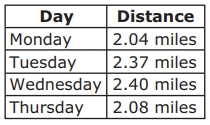Clusters should not be sorted from Major to Supporting and then taught in that order. To do so would strip the coherence of the mathematical ideas and miss the opportunity to enhance the major work of the grade with the supporting clusters.
- Assessment Limits :
Decimals may reference the same whole entity. Decimals are limited to tenths and hundredths. Decimals may be greater than 1. Items may not require a comparison of visual models in isolation. - Calculator :
No
- Context :
Allowable
- Test Item #: Sample Item 1
- Question: Mr. Shelby bought a new plant. The plant grew 2.6 centimeters in the first week
and 3.42 centimeters the second week.
Select all the true comparisons of the plant growth for the two weeks.
- Difficulty: N/A
- Type: MS: Multiselect
- Test Item #: Sample Item 2
- Question: Zach and Karla each have seeds they will plant in a class garden. Zach’s seeds
weigh 1.5 grams. Karla’s seeds weigh 1.46 grams.
Fill in the circles to select the correct symbol for each comparison.

- Difficulty: N/A
- Type: MI: Matching Item
- Test Item #: Sample Item 3
- Question: Allison wrote down a decimal number that is greater than 0.58 but less than 0.62.
What is one number Allison could have written down?
- Difficulty: N/A
- Type: EE: Equation Editor
- Test Item #: Sample Item 4
- Question: The table shows the distances that Brianna ran on four days.

Which comparison about the distances is true?
- Difficulty: N/A
- Type: MC: Multiple Choice
Related Courses
Related Access Points
Related Resources
Formative Assessments
Lesson Plans
Original Student Tutorial
Problem-Solving Task
Tutorial
Virtual Manipulative
STEM Lessons - Model Eliciting Activity
Students will help Amazing Alice Cookies choose the perfect chocolate chip brand to use for their cookies. Students will be given data in the form of fractions and decimals. Fourth grade students will compare decimals and order and compare fractions. Students will write a letter describing their procedure to the client.
Model Eliciting Activities, MEAs, are open-ended, interdisciplinary problem-solving activities that are meant to reveal students’ thinking about the concepts embedded in realistic situations. Click here to learn more about MEAs and how they can transform your classroom.
Students will determine what cell phone would be the best phone for their teacher to purchase for science class. Factors to consider are price, touch screen, camera, voice command, weight and display size. Students will need to compare decimals to determine how to order and rank the phone brands.
Model Eliciting Activities, MEAs, are open-ended, interdisciplinary problem-solving activities that are meant to reveal students’ thinking about the concepts embedded in realistic situations. Click here to learn more about MEAs and how they can transform your classroom.
MFAS Formative Assessments
Students are asked to compare four pairs of decimals using the less than, greater than, or equal to symbols.
Students are asked to compare two pairs of decimals in the context of word problems and to record a comparison using an inequality symbol.
Students are asked to consider two grids with different sized wholes and determine if both models show four-tenths.
Students are asked to compare decimals by drawing a visual model and record the comparison using the less than, greater than, or equal to symbol.
Original Student Tutorials Mathematics - Grades K-5
Learn how to locate decimals on a number line and compare decimals to save the Decis from a wizard's spell in this interactive tutorial.
Student Resources
Original Student Tutorial
Learn how to locate decimals on a number line and compare decimals to save the Decis from a wizard's spell in this interactive tutorial.
Type: Original Student Tutorial
Problem-Solving Task
Each part of this task highlights a slightly different aspect of place value as it relates to decimal notation. More than simply being comfortable with decimal notation, the point is for students to be able to move fluidly between and among the different ways that a single value can be represented and to understand the relative size of the numbers in each place.
Type: Problem-Solving Task
Tutorial
In this Khan Academy tutorial video two decimals are compared using grid diagrams.
Type: Tutorial
Parent Resources
Problem-Solving Task
Each part of this task highlights a slightly different aspect of place value as it relates to decimal notation. More than simply being comfortable with decimal notation, the point is for students to be able to move fluidly between and among the different ways that a single value can be represented and to understand the relative size of the numbers in each place.
Type: Problem-Solving Task









